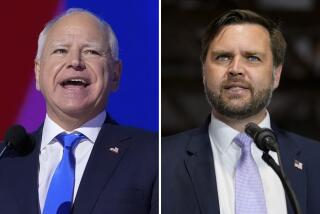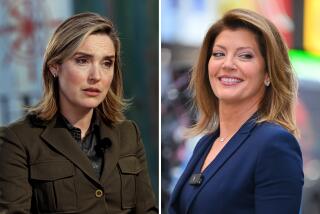Dates, Sites Selected for 3 Debates : Politics: The forums pitting Bush against Clinton will be televised nationally. One will be held in San Diego.
- Share via
WASHINGTON — The dates and sites of three proposed debates between President Bush and Democrat Bill Clinton, including one in San Diego on Oct. 4, will be announced today by the bipartisan group planning for the nationally televised forums.
The first debate is scheduled to take place Sept. 22 at Michigan State University in East Lansing, and the final debate is scheduled for Oct. 15 at the University of Richmond in Virginia, according to Janet Brown, executive director of the Commission on Presidential Debates.
The San Diego site is the University of San Diego, which will announce its selection at a news conference this morning.
The Clinton campaign has sent a letter accepting the debating sites, Brown said. The commission has not yet received a formal commitment from the Bush camp.
“We are looking forward to hearing from the Bush campaign,” Brown said, “but in the past they have waited until after the Republican Convention to officially agree to the sites.”
The arrival of James A. Baker III as Bush’s chief of staff might change the plans, according to another commission source.
“He’s a less-not-more guy,” the source said, “and may want to drop a debate. Anything’s possible.”
In 1988, a debate planned for Annapolis was scratched because it was scheduled too early, the source said.
A debate between Vice President Dan Quayle and Democratic contender Sen. Al Gore is scheduled for Louisville, Ky., on Sept. 29, Brown said.
In a significant change from previous debate formats, the 90-minute sessions will have a moderator but no media panel--the first time since 1976 that the candidates will not face media questions.
“We wanted to minimize the intrusion of questioners and maximize the role of the candidates,” said Brown.
Other format details--length of opening and closing statements, how long the candidates will have to talk, and whether they will ask questions of each other--are still being worked out. Also under consideration by the commission is whether to have a live audience.
Earlier in the year, negotiations between the commission and the four major TV networks broke down over who would control the debates. One sticking point was the moderators. The networks wanted their anchors, but the commission also wanted to consider print journalists.
Whoever the commission recommends will be someone “with broadcast experience,” Brown said. “They won’t be making their debut at the debates.”
Some network officials believe that the failed talks merely confirm that political parties want to maintain as much control as possible over the production of debates in order to give maximum advantage to their candidates--or to prevent embarrassment.
The nonprofit commission was formed in 1987 and has 10 directors, all politically savvy. The co-chairs are Frank J. Fahrenkopf Jr., a former Republican Party chairman, and Paul G. Kirk Jr., a former Democratic Party chairman.
The commission did considerable research on how to structure the most effective format by interviewing candidates, academics and media experts, Brown said.
On the issue of debate audiences, the arguments cut both ways, she said.
“We heard some complaints about the audience noise interfering with people hearing what the candidates said,” Brown said. “But without an audience the candidates can lapse into ‘inside baseball’ language. With people in the studio, the candidates are reminded they are talking to a television audience too.”
The first televised presidential debate, between John F. Kennedy and Richard M. Nixon, was produced by the networks in 1960. The League of Women Voters sponsored the next debate in 1976 and also organized subsequent debates in ’80 and ’84.
The commission took over for the 1988 debates.
No debates were held in 1964, 1968 and 1972.
More to Read
Get the L.A. Times Politics newsletter
Deeply reported insights into legislation, politics and policy from Sacramento, Washington and beyond. In your inbox twice per week.
You may occasionally receive promotional content from the Los Angeles Times.










